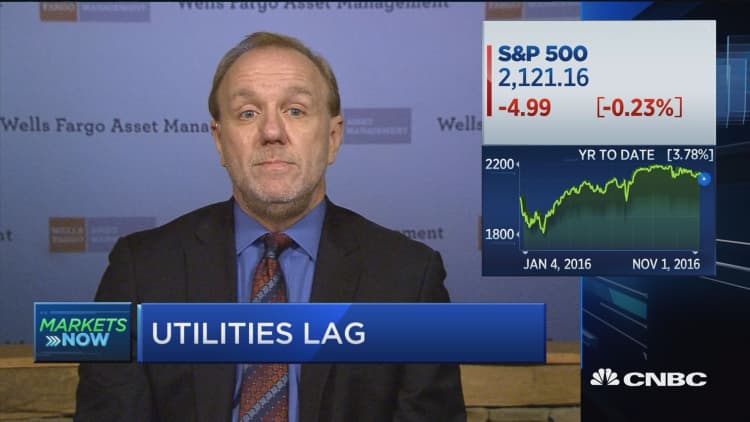Blame the presidential election for hurting stock markets.
It's not just that this election is unprecedented in many ways — which it is — but it's also that every time Americans have voted for a new president in recent decades, markets tend to slog their way through November rather than climb.
In Novembers during presidential election years, the S&P 500 falls short of the overall November average, rising 56 percent of the time with an average* return of about half a percent, according to analysis of the last nine presidential elections using Kensho. That's a little better than a coin-flip chance for a slight monthly gain.
In contrast, the average return more than doubles to 1.7 percent and the market rises nearly three-fourths of the time in non-U.S. presidential election years, the data showed.
"There's a lot of fear and there's a lot of angst and there's a lot of uncertainty," said Brad McMillan, chief investment officer at Commonwealth Financial Network. "Once the election is over, people are going to feel better regardless of the outcome."
November performance
Historically, November is the beginning of the "Best Six Months" for the Dow Jones industrial average and the S&P 500, according to the Stock Trader's Almanac. The month also "marks the beginning of the best consecutive three-month span" that ends in January, the almanac said.
But this year's Nov. 8 election will likely back the start of any rally to at least later in the month.
"The next two weeks are difficult because we have an election coming up and markets seem to be very complacent," said John Bredemus, vice president, Allianz Investment Management.
"I think the markets have decided on a winner, and while volatility has clearly picked up recently, it is difficult to determine if it is being driven by election uncertainty or economic data," Bredemus said. "Recent news about better growth in the U.S. and abroad, especially China, has pushed bond yields higher."
Markets have generally priced in a continuation of the status quo — market-friendly gridlock — with Democrat Hillary Clinton as president and Republican dominance in Congress. The latest NBC News|SurveyMonkey Weekly Election Tracking Poll showed Clinton holding her roughly 6-point national lead.

Still, investors fear the unexpected.
Last Friday, FBI Director James Comey told lawmakers the bureau is looking at new emails related to Clinton, and though he revealed nothing about what may or may not be in those emails, the news jolted markets. Stocks sold off, bond yields fell and gold spiked.
The second-to-last month of the year brings a flurry of other events for investors to watch. The Federal Reserve is set to conclude its two-day meeting Wednesday, and traders will look for signals on a widely expected December rate hike. The jobs report due this Friday will also be a key indicator of Fed policy, as well as U.S. economic growth.
"I'm going to be paying more attention to the jobs report this Friday," McMillan said. "The only way the election is important is if Mr. Trump gets elected. Then we have to come to grips with (how his policy plays out)."
McMillan and other market analysts generally expect stocks to react to the election as they did in June after the surprise U.K. vote to leave the European Union. The S&P 500 fell more than 5 percent in the two trading days following, but then rallied to all-time highs this summer.
Now as the election looms, the major averages have held steady a few percentage points below their record highs. Market strategists surveyed by CNBC in October on average expect the S&P 500 to reach a new high of 2,198 by the end of the year.
Consumer discretionary stocks have been among the top performers in November. The sector has an average return of 2.66 percent in non-presidential election years since 1980, but just 0.28 percent during the last six presidential election years, according to Kensho.
Disclosure: CNBC's parent NBCUniversal is a minority stakeholder in Kensho.
*Kensho uses the geometric average, versus the simple arithmetic average.


